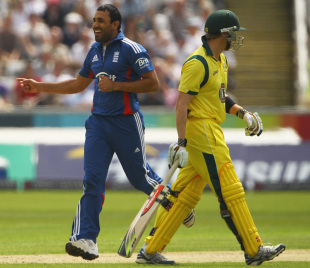England v Australia, 2012
Richard Hobson
One-day internationals (5): England 4, Australia 0

|
|||
|
Related Links
Series/Tournaments:
Australia tour of England and Ireland
|
|||
Australia's players arrived in England with the threat of strike action hanging over negotiations for a new pay deal with their board. As a one-sided NatWest Series unfolded, thoughts of a return home must have seemed increasingly alluring: while the issues concerning terms and conditions were resolved during the trip, questions of a different kind began to emerge - principally, how was it that a side at the top of the ICC rankings could suffer their heaviest defeat in any head-to-head limited-overs campaign?
The scoreline hardly flattered England. If rain had not washed out the third match at Edgbaston, they might easily have completed the 5-0 whitewash required to dislodge Australia and move top of the rankings in all three formats; such dominance would have been unprecedented (even if the Twenty20 listings had been introduced only the previous October). As losses piled up, the tourists did not mince words. Australia's coach, Mickey Arthur, described his team as "submissive", "bullied", and lacking presence, while captain Michael Clarke spoke of "a wake-up call". It could not have been louder had it been rung from the bells of St Paul's.
If this all seemed very un-Australian, then England were very English. Team director Andy Flower built a strategy perfectly suited to home conditions and the personnel available. Batsmen with Test-standard techniques were included to combat the two new balls in often tricky conditions, and a bowling attack heavy with specialist pace was threatening throughout. It takes far more than good organisation to overpower Australia so comprehensively, but Flower was entitled to wonder whether his plan could have gone any better. Only the number of dropped catches can have caused any alarm, with the notable exception of Craig Kieswetter's athleticism behind the stumps.
By the end, England had extended their sequence of one-day wins to ten (excluding washouts) since the start of the year. Any lingering concerns about the top three were removed: not even the harshest critic questioned the right of Alastair Cook, Ian Bell and Jonathan Trott to fill those slots. When Bell fell fourth ball in the final game at Old Trafford, it was his first failure since replacing Kevin Pietersen - now retired from the format, at least for the time being - at the start of the previous series, against West Indies. Circumstances allowed Trott to bat at his own pace, and Ravi Bopara grew in confidence to the point where he supervised the chase in Manchester like Eoin Morgan at his calmest. As he also provided some tight contributions with the ball, Bopara was unlucky that Bell pipped him for the Man-of-the-Series award. Morgan himself put a sorry winter behind him to finish unbeaten in his three innings; his 141 runs came at a strike-rate of 130.
Australia had wondered in advance whether Tim Bresnan was a potential weakness at No. 7, but in the event he was not required to bat at all, while Kieswetter at No. 6 faced only 29 balls. In the four games, England lost 14 wickets to Australia's 32. Those facts speak for the Australian bowling as well as England's batting. Only Clint McKay, persevering and accurate, claimed more than two wickets overall. Pat Cummins was forced to return home with a side strain after the first game, a worrying extension to his run of injuries. Shane Watson and Brett Lee followed after the fourth match, at Chester-le-Street, because of calf problems, though not before Lee - who announced his retirement shortly after the tour - had equalled Glenn McGrath's record of 380 one-day international wickets for Australia. James Pattinson, built up beforehand, did not appear until late in the series - then went wicketless in 16 overs. And Australia lagged even further behind in the spin department, with Graeme Swann outbowling Xavier Doherty before Swann was withdrawn from the squad because of continuing soreness in his right elbow.
Arthur tried to find some comfort, suggesting that England had shown opponents the approach required for the Champions Trophy, which they would be hosting in 2013. The Ashes series later that summer provided another appetising context, with John Inverarity, Australia's chairman of selectors, saying that David Hussey, Peter Forrest and George Bailey represented the next-best batsmen below those in the current Test team. Hussey (who turned 35 shortly after this series) barely needed experience in England, after much success with Nottinghamshire, but he and Bailey, the Twenty20 captain, both proved inconsistent; the only consistent thing about Forrest was his tentative footwork, exposed by the moving ball. A general uncertainty became evident as Australia tried in vain to reshuffle their hand in the absence of Hussey's older brother Mike, at home on paternity leave. By the end, the aces were all England's.
Match reports for
Tour Match: Leicestershire v Australians at Leicester, Jun 21, 2012
Scorecard
Only ODI: Ireland v Australia at Belfast, Jun 23, 2012
Scorecard
Tour Match: Essex v Australians at Chelmsford, Jun 26, 2012
Scorecard
1st ODI: England v Australia at Lord's, Jun 29, 2012
Report |
Scorecard
2nd ODI: England v Australia at The Oval, Jul 1, 2012
Report |
Scorecard
3rd ODI: England v Australia at Birmingham, Jul 4, 2012
Report |
Scorecard
4th ODI: England v Australia at Chester-le-Street, Jul 7, 2012
Report |
Scorecard
5th ODI: England v Australia at Manchester, Jul 10, 2012
Report |
Scorecard

